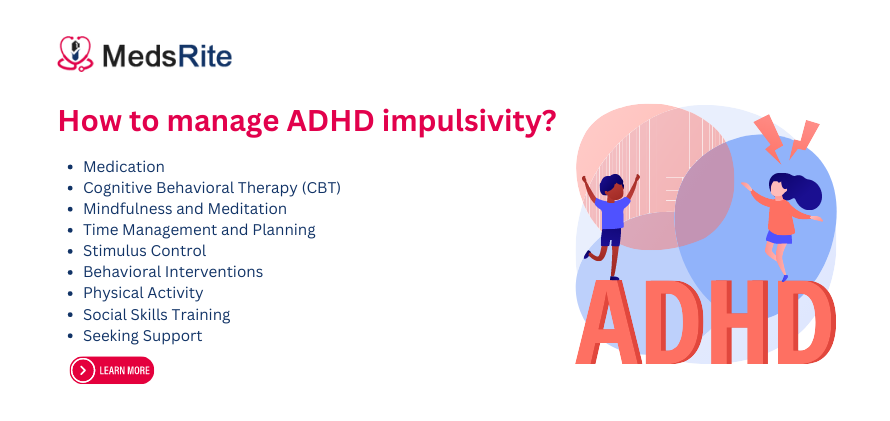Learn top ADHD impulsivity management strategies to improve focus, self-control, and better decision-making.
Introduction
Attention-deficit/hyperactivity disorder (ADHD) is a neurodevelopmental disorder characterized by symptoms like inattention, hyperactivity, and impulsivity. Impulsivity, in particular, can significantly impact daily life and relationships.
However, with the right strategies, individuals with ADHD can learn to manage impulsivity and lead more balanced lives. In this blog, we will explore effective techniques to manage ADHD impulsivity.
Understanding the way to manage ADHD impulsivity
Impulsivity in ADHD refers to the tendency to act without thinking about the consequences, often driven by immediate desires or emotions.
This can lead to difficulties in various areas, such as social interactions, work, and personal relationships. Understanding the root causes of impulsivity is crucial for effective management.
Medication
For some individuals, medication prescribed by a medical professional or certified pharmacy can be beneficial to manage ADHD impulsivity. Medications like stimulants or non-stimulants can help regulate brain activity and enhance impulse control.
Adderall
Adderall is a widely used prescription medication that belongs to the class of central nervous system stimulants. It is primarily prescribed to treat attention-deficit/hyperactivity disorder (ADHD) and narcolepsy.
Adderall’s active ingredients, amphetamine, and dextroamphetamine, work by affecting neurotransmitters in the brain, leading to improved focus, attention, and impulse control.
In this section, we’ll delve into the benefits, risks, and important considerations surrounding Adderall medication.
Vyvanse
For individuals struggling with ADHD impulsivity, medication can be a valuable tool in their management arsenal.
Vyvanse, a commonly prescribed medication, offers a unique approach to addressing ADHD symptoms. In this blog, we will delve into the details of Vyvanse, its mechanism of action, benefits, and important considerations.
Vyvanse (Lisdexamfetamine) is a prescription stimulant medication approved for the treatment of ADHD in both adults and children. It works by increasing the availability of certain neurotransmitters in the brain, primarily dopamine and norepinephrine, which play a crucial role in attention and impulse control.
Cognitive Behavioral Therapy (CBT)
CBT is a well-established therapeutic approach that can help individuals with ADHD manage impulsivity. It focuses on identifying negative thought patterns and replacing them with more rational ones. CBT equips individuals with coping skills to pause and evaluate their actions before acting impulsively.
Mindfulness and Meditation
Mindfulness techniques teach individuals to be present at the moment and observe their thoughts and feelings without judgment.
Regular practice of mindfulness meditation can enhance self-awareness, allowing individuals to recognize impulsive urges as they arise and choose more deliberate responses.
Time Management and Planning
Creating structured routines and setting clear goals can help individuals with ADHD manage impulsivity. Breaking tasks into smaller, manageable steps and using tools like planners or digital apps can aid in staying organized and minimizing impulsive behaviors.
Stimulus Control
Minimizing environmental triggers that prompt impulsive behavior is essential. This can involve removing distractions, creating an organized workspace, and establishing clear rules and boundaries for tasks and activities.
Behavioral Interventions
Positive reinforcement techniques, such as reward systems, can be effective ways to manage ADHD impulsivity. Setting up a system where desired behaviors are rewarded can motivate individuals to think before acting and make more considered choices.
Physical Activity
Engaging in regular physical activity has been shown to have a positive impact on ADHD symptoms, including impulsivity. Exercise releases endorphins, which can improve mood and focus, leading to better self-regulation.
Social Skills Training
Learning effective communication and social interaction skills can help individuals with ADHD navigate situations that trigger impulsive behavior. Practicing active listening and considering the perspectives of others can promote more thoughtful responses.
Seeking Support
Individuals with ADHD should not hesitate to seek support from professionals, such as therapists, counselors, or ADHD coaches. These experts can provide personalized guidance and strategies to manage impulsivity based on individual needs.
Conclusion
The way to manage ADHD impulsivity requires a multi-faceted approach that combines self-awareness, behavioral strategies, and sometimes, medical intervention.
By incorporating techniques like CBT, mindfulness, time management, and social skills training, individuals with ADHD can gain better control over their impulses and lead more fulfilling and balanced lives.
It’s important to remember that managing ADHD impulsivity is a journey that takes time and effort, but the results can lead to improved overall well-being and a more satisfying life experience.

